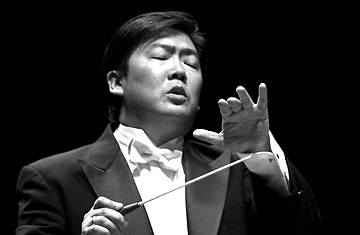
Long Yu
Long Yu has come a long way since the day in 1976 when he accidentally killed a duck. The duck was going to die anyway, but not until it had been properly fattened up in the breeding factory where Long, then 12, was required to work in the waning days of China's Cultural Revolution. The ducks were force-fed through a tube operated by a foot-pedal — a single pump per meal. One day Long got careless and accidentally pumped twice. End of duck.
"Boys' minds wander sometimes," he says today. "Still, the factory bosses were very angry at me."
Nobody in Chinese officialdom gets angry at Long anymore. The artistic director and chief conductor of the China Philharmonic Orchestra, Long spent this October the way he's spent all his recent Octobers, dashing from concert hall to concert hall around Beijing, joining the capacity crowds jamming into decidedly Chinese venues to hear some decidedly un-Chinese music: Puccini in the Forbidden City; Dido & Aeneas at the Beijing Concert Hall; Handl's Messiah at the Wang Fu Jing Church; Wagner's Tannhäuser at the downtown Poly Theater. People who order their tickets in advance get in; the rest get introduced to another Western tradition — scalpers, who buy in bulk and sell out fast. It's been that way every year since Long first launched the annual Beijing Music Festival (BMF) in 1998. And that, most people in the Chinese arts community believe, is nothing compared to the classical music explosion still to come.
"Fifty million Chinese children are now studying a classical instrument," says Long. "In 20 years, I believe China will be one of the biggest countries in the world for music."
The idea of China as the gravitational center of a globalized world is something most countries have gotten used to. But classical music hadn't seemed like it would be part of that mix, if only because Western opera and the Eastern world never made a natural fit. To outsiders, the traditional Peking opera seemed as much circus as song, with extraneous acrobatics and melodies that struck European ears as atonal and arhythmic. Western opera — with its volume and bombast — fell similarly flat in the East. But since Western ways were the planet's dominant ones, it was China that was open to learning from the outside. "If a poor country wanted to develop, it had to follow the West," says composer and conductor Guo Wenjing who performed at this year's BMF.
Maoism and the Cultural Revolution made that harder to do. Even indigenous opera was swept aside in favor of such turgid revolutionary works as The Red Detachment of Women and Taking Tiger Mountain by Strategy. Long experienced the suffocation of the musical arts in a more personal way than most when his grandfather, who had studied music in Paris, was sent to the country to work — but only after the Red Guards destroyed his musical library. "When I was five he started teaching me music anyway," Long says. "We were only allowed to learn revolutionary songs, but he taught them in a classical style."
The artistic thaw didn't begin until the 1970s, as warming relations between the U.S. and China made cultural exchanges possible, including visits by the Philadelphia Symphony in 1973 and violinist Isaac Stern in 1979. That fired the musical interests of the Chinese at the same time the country's domestic policies were boosting music in other, unintended ways. Even during the Cultural Revolution, there was a need for musicians who could play the approved political operas; young people clamored to land those jobs, if only because that would permit them to remain in the city, rather than being sent to collectives in the country. What's more, China's one-child policy made parents protective of the tiny families they were allowed to have and reluctant to take any chances with them. "A lot of children were made to study piano simply because it kept them home and off the streets," says Long.
